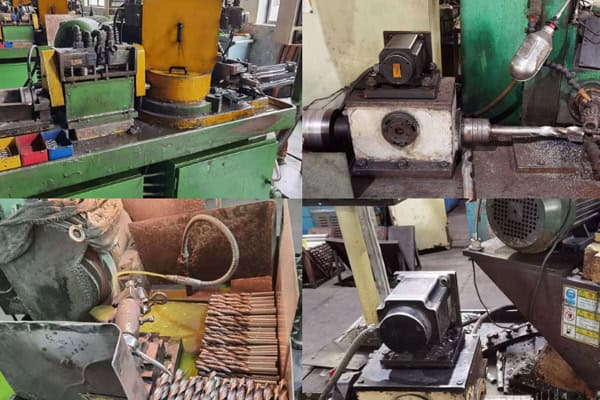
Choosing the right twist drill bit supplier can make or break your business. It’s not just about price—it’s about quality, reliability, and long-term value. A good supplier ensures your products meet customer expectations while keeping costs in check.
The right twist drill bit supplier ensures consistent quality, timely delivery, and cost efficiency. To find the best fit, evaluate factors like production capacity, certifications, lead times, and customization options.
Finding the right supplier is a strategic decision. Let’s dive deeper into the key factors that will help you make the best choice for your business.
Key Factors to Consider When Selecting a Twist Drill Bit Supplier?
Not all suppliers are created equal. Some excel in quality, while others focus on cost—how do you decide?
When selecting a supplier, prioritize factors like product certifications, production capabilities, customization options, and their track record for reliability.
Key Factors Explained
| Factor | Why It Matters |
|---|---|
| Certifications | ISO and CE certifications ensure the supplier meets international quality standards. |
| Capacidad de producción | High capacity means they can handle bulk orders without delays or quality issues. |
| Customization | Custom branding or packaging adds value to your product offering. |
| Track Record | A supplier with a proven history of reliability reduces risks for your business. |
Investing time in evaluating these factors ensures you partner with a supplier who aligns with your business goals. For example, I once worked with a supplier who offered competitive pricing1 but lacked certifications. The result was inconsistent quality2 and unhappy customers. This experience taught me the importance of verifying certifications upfront.

Comparing Small vs. Large-Scale Twist Drill Bit Suppliers: Pros and Cons?
Should you go with a small supplier or a large one? Each has its strengths and weaknesses.
Small suppliers often offer more flexibility and personalized service, while large suppliers provide stability and scalability. Your choice depends on your specific business needs.
Pros and Cons Comparison
| Aspect | Small Suppliers | Large Suppliers |
|---|---|---|
| Flexibilidad | Highly flexible with custom orders. | Limited flexibility due to standardized processes. |
| Cost Efficiency | May offer lower prices for small batches. | Better economies of scale for bulk orders. |
| Personalized Service | Direct communication and tailored solutions. | Less personalized, often dealing with departments. |
| Scalability | Limited capacity for large orders. | High capacity ensures consistent supply. |
Understanding these trade-offs helps you decide which type of supplier fits your business model. For instance, a small supplier3 might be ideal for niche markets, while a large supplier4 is better for high-volume production.
The Role of Lead Time and Flexibility in Supplier Selection?
Lead time can impact your ability to meet customer demands—how important is it?
Lead time and flexibility are critical in supplier selection. A shorter lead time ensures faster delivery, while flexibility allows for adjustments based on market demands.
Breaking Down Lead Time and Flexibility
| Factor | Impact |
|---|---|
| Short Lead Time | Ensures timely delivery, reducing stockouts and improving customer satisfaction. |
| Flexibility in Orders | Allows you to adjust quantities or specifications based on changing needs. |
| Capacidad de producción | A supplier with high capacity can handle rush orders without compromising quality. |
| Logistics Efficiency | Reliable logistics partners ensure smooth delivery, even for international orders. |
Balancing lead time with flexibility ensures you can respond quickly to market demands. For example, during a surge in demand, a supplier with flexible production schedules5 helped me avoid stockouts and retain customers.
Ensuring Quality Control and Cost Efficiency with Your Drill Bit Supplier?
How do you balance quality and cost without compromising your product standards?
Quality control and cost efficiency go hand in hand. A reliable supplier implements strict quality checks while offering competitive pricing through efficient processes.
Quality Control and Cost Efficiency Strategies
| Strategy | Impact |
|---|---|
| Regular Audits | Ensures consistent quality by monitoring production processes. |
| Material Selection | High-quality materials reduce defects and increase product lifespan. |
| Producción eficiente | Streamlined processes lower costs without sacrificing quality. |
| Testing Protocols | Rigorous testing ensures each drill bit meets performance standards. |
By prioritizing both quality and efficiency, you can deliver superior products at a competitive price. For example, I once worked with a supplier who used subpar materials to cut costs. The result was a high return rate and damaged reputation. This taught me the importance of inspecting materials and production processes.
The Importance of Communication and Relationships in Supplier Partnerships?
Why is communication crucial in maintaining a good relationship with your supplier?
Clear and consistent communication builds trust and ensures smooth operations. Strong relationships lead to better collaboration and problem-solving.

Building Effective Communication
| Practice | Benefit |
|---|---|
| Regular Updates | Keeps both parties informed about order status and potential issues. |
| Transparency | Encourages honesty and builds trust over time. |
| Feedback Loops | Allows for continuous improvement and resolving issues quickly. |
| Cultural Understanding | Bridges gaps in communication styles, especially in international partnerships. |
Effective communication is the backbone of a successful partnership. For example, I once faced a delay due to a miscommunication with a supplier. After implementing regular check-ins, we resolved issues faster and improved efficiency.
Evaluating Pricing Structures and Payment Terms?
How can you ensure that the pricing and payment terms are fair and beneficial for your business?
Understanding the supplier’s pricing structure and payment terms helps you manage costs and cash flow effectively.
Pricing and Payment Considerations
| Aspect | Details |
|---|---|
| Bulk Discounts | Leverage lower prices for larger orders to reduce costs. |
| Payment Flexibility | Negotiate terms that align with your cash flow, such as net-30 or net-60. |
| Hidden Costs | Clarify additional fees like shipping, customs, or taxes upfront. |
| Price Stability | Ensure pricing is consistent and not subject to sudden increases. |
Analyzing pricing structures ensures you get the best value for your money. For instance, I once saved 15% by negotiating bulk discounts and favorable payment terms with a supplier.

The Impact of Geographic Location on Supplier Selection?
Does the location of your supplier matter in today’s global market?
Geographic location affects lead times, shipping costs, and cultural compatibility. Choosing the right location can optimize your supply chain.
Geographic Factors to Consider
| Factor | Impact |
|---|---|
| Proximity | Closer suppliers reduce shipping times and costs. |
| Cultural Fit | Shared business practices and communication styles streamline collaboration. |
| Logistics Infrastructure | Reliable transportation networks ensure timely deliveries. |
| Time Zones | Overlapping working hours facilitate real-time communication. |
Selecting a supplier in the right geographic location can enhance efficiency and reduce costs. For example, working with a supplier in Asia6 provided cost savings, but understanding time zone differences was crucial for smooth communication.
Conclusión
Choosing the right twist drill bit supplier requires careful evaluation of quality, flexibility, cost, and communication. A strategic partnership ensures long-term success for your business by delivering consistent value to your customers.
-
Understanding competitive pricing can help you make informed decisions when choosing suppliers, ensuring better alignment with your business goals. ↩
-
Learning about solutions for inconsistent quality can help you maintain high standards and keep your customers happy. ↩
-
Exploring this link will provide insights into how small suppliers can cater to niche markets effectively, enhancing your business strategy. ↩
-
This resource will help you understand the advantages of large suppliers in scaling production, crucial for businesses aiming for growth. ↩
-
Exploring the advantages of flexible production can help businesses adapt to changing market conditions and improve customer satisfaction. ↩
-
Exploring this link will provide insights into the advantages of sourcing from Asia, including cost savings and efficiency. ↩